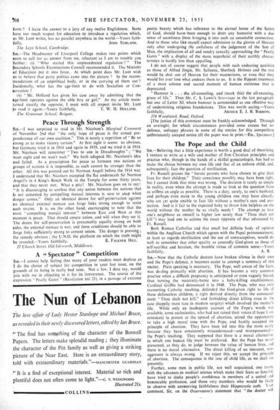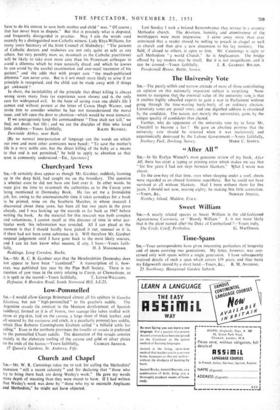SIR,—Now that the Catholic doctors have broken silence in their
own and the Pope's defence, it becomes easier to attempt a summary of this mutter. Plain speaking is necessary. The Pope, well aware of the facts, was dealing primarily with abortion. It has become a very common practice when a difficult pregnancy is anticipated or even vaguely feared, thus turning the maternity-home into a baby-killing establishment. Cardinal Griffin had denounced it in 1948. The Pope, who was only reasserting Catholic teaching, defended the God-given right to life of these defenceless children, a right derived directly from the command- ment " Thou shalt not kill," and forbidding direct killing even in the case (happily most rare in modern surgery) which involved the mother's life. While only an inadequate account of the Pope's words was available, some ecclesiastics, who had not raised their voices (I hope I am mistaken) in protest at the spread of abortion, seized the opportunity to take a high moral tone with the Pope, and hastily accepted the principle of abortion. They have been led into this the more easily because they have consistently misunderstood—and misrepresented— the Pope's teaching. They supposed that there is a moral alternative, in which one human life must be preferred. But the Pope has never presumed, as they do, to judge between the value of human lives, and there is no moral alternative. The direct killing of an innocent, non- aggressor is always wrong. If we reject this, we accept the principle of abortion. The consequence is the loss of child life, as we shall see presently. Further, some men in public life, not well acquainted, one trusts, with the advances in medical science which make their fears so fanciful, have tried to shake people's confidence in members of a united and honourable profession, and those very members who would be likely to observe with unswerving faithfulness their Hippocratic oath. Your comment. Sir, on the Osservatore's statement that "the doctor will have to do his utmost to save both mother and child" was, " Of course ; that has never been in dispute." But that is precisely what is disputed, and frequently disregarded in practice. May I cite the words used recently by a distinguished non-Catholic witness, Lady Rhys-Williams, for many years- Secretary of the Joint Council of Midwifery: "The patients of Catholic doctors and midwives are not only quite as safe as any others. but very possibly more so, inasmuch as the Catholic practitioner will be likely to take even more care than his Protestant colleague to avoid a dilemma which he must naturally dread, and which he knows he can avoid by the careful examination and ante-natal treatment of his patient," and she adds that with proper care " the much-publicised dilemma " can never arise. But is it not much more likely to arise if no
is recognised, and the child can be made away with if things get awkward 7 In short, the inviolability of the principle that direct killing is always wrong saves many lives (as experience soon shows) and is the only cure for widespread evil. In the hope of saving even one child's life I cannot end without protest at the letter of Canon Hugh Warner, and invite him to consider whether he has not misunderstood the moral issue, and left open the door to abortion—which would be most immoral.
If we courageously keep the commandment "Thou shalt not kill," we find, not death, but life ; and we are the disciples of Him who loved Downside Abbey, near Bath.
[By no normal interpretation of language can the words on which our own and most other comments were based: "To save the mother's life is a very noble aim, but the direct killing of the baby as a means to that end is not permitted," be held to apply to abortion as that term is commonly understood.—Ea, Spectator.]



































 Previous page
Previous page